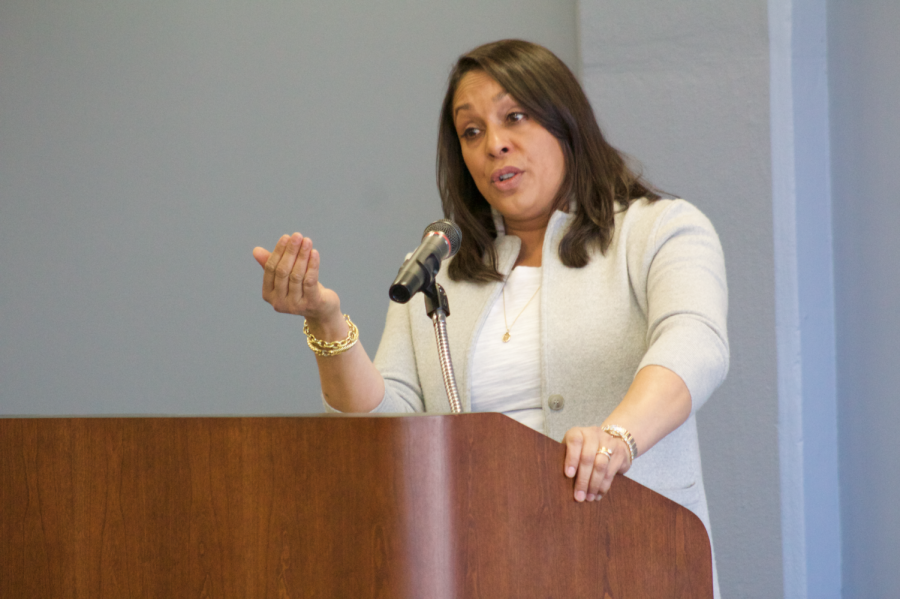Seventh Annual Poet Laureate Q&A Session
April 18, 2018
Kent State had its seventh annual poet laureate come to campus Wednesday to have a Q&A session followed by a reading.
This year, Natasha Trethewey spoke to a small crowd in the Garden Room. She spoke of having two existential wounds that hurt her into poetry, holding a small handkerchief to her eyes.
“The way Auden described it in his memorial to Yeats, mad Ireland hurt me to poetry. Well, mad Mississippi hurt me into poetry with its history of violence, racism and oppression. I think my deeper wound was losing my mother (at age 19) and that’s the moment I started writing,” Trethewey said.
Trethewey is the 19th Poet Laureate of the United States, serving from 2012 to 2014. She is the author of four poetry collections: “Thrall,” “Native Guard,” “Bellocq’s Ophelia” and “Domestic Work.”
She received the Pulitzer Prize for “Native Guard”and won the inaugural Cave Canem Poetry Prize for “Domestic Work,” chosen by Rita Dove for being the best first book written by an African-American poet.
Throughout the session, Trethewey spoke of being biracial and the impact it had on her relationship with her white father, and her black mother.
“There is a photograph that was taken of me when I was three years old. We went to Mexico and in this photograph, it’s just me and I’m sitting on the back of the mule and I talk about how it was my father’s idea to placing me on the back of the mule,” Trethewey said. “And it was figurative because it’s kind of a sight gag, have a mixed race child riding her name sake.”
She did research reading about art historians and looking at paintings of biracial families. Trethewey talks about how her mother knew, since she was a mixed-race child, that Trethewey would be bound by history.
She writes about it in her poem “Enlightenment,” which she read to the audience.
Poet Laureate
As the nation’s official poet, the Poet Laureate Consultant in Poetry to the Library of Congress seeks to raise the national consciousness to a greater appreciation of the reading and writing of poetry.
The Poet Laureate is appointed annually by the Librarian of Congress, for a term that lasts from September to May. The Laureate gives a reading to open the Library’s annual literary series and a lecture to conclude the series, the oldest in the Washington area and among the oldest in the United States.
“When we think of the enlightenment, we love it and it did so much for us. Yet it was also the moment that enlightenment philosophers began to codify ideas about race and difference and racial hierarchy,” she said.
She saw this history between her and her father, even though she loved him, this topic had barely been discussed.
“I wanted to try and find a way to have a necessary, private conversation with my father but in a very public way, in what i thought was the only language he would listen to,” Trethewey said. “Which is the language of poetry.”
She felt drawn to these images of the mixed families since she saw the reflection, but her focus was more on the relationships within them. Such as the father and child.
“And the mother, like my mother, who has been dead 33 years now, was disappearing. Erased in some ways,” she said. “That was manifested in a lot of these paintings in the way that a very black woman would almost be as dark as the canvas upon which she was painted and thus invisible.”
Trethewey followed the Q&A with a reading at 7:30 to close the Wick Poetry Center 2017-18 season.
Gyyorgi Mihalyi-Jewell does PR and marketing for the Wick Poetry Center and was proud of their season.
“We had different poets coming in and reading, but there wasn’t a specific topic or theme that we try to target,” she said. “However, in March, because we are a part of the Poetry Coalition that is a national organization of 20 something poetry organizations, we did workshops and readings (focused) on the body.”
Beyond that month, Mihalyi-Jewell said that they focus on their reading series and filling it with wonderful people.
David Hassler, the director of the Wick Poetry Center, was grateful to the Kent State libraries, the Honors College and the Department of English for working with them to continue this annual event.
He saw the importance in Trethewey’s work with how she brought her own personal history and intertwined it with the actions, her touching on race relations and on the debate for who has claim to these narratives.
“I think (the poet laureates) bring a sort of vital life to poetry … to our students and our communities here,” he said. “(They) connect us with that sort of pulse of poetry.”
Madison MacArthur is the Diversity reporter. Contact her at [email protected].












